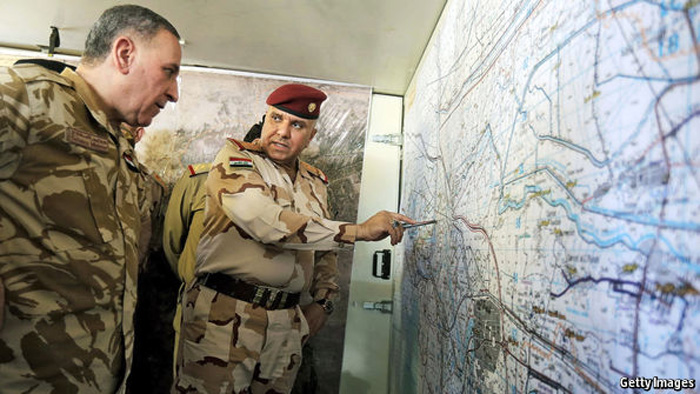FALLUJAH is a place with bad memories for the American soldiers who served in Iraq. Two battles in 2004, the second of which was the bloodiest of the whole war, confirmed it as the stronghold of the insurgency that arose to challenge the American occupation. It was also the first big city to fall to Islamic State (IS) at the outset of its rampage across Iraq in 2014. Now there is to be a third battle of Fallujah. On May 22nd Iraq’s prime minister, Haider al-Abadi, declared that an offensive to retake the city, which lies only half an hour’s drive west of Baghdad, had begun.
For the American-led coalition fighting IS, the decision to go for Fallujah makes little military sense. The priority remains wresting back Mosul, Iraq’s second-biggest city, which fell to IS two years ago. Preparatory operations are well under way, although few believe that the security forces will be ready to move in before the end of the year. The Americans fear that Fallujah will become a distraction that will delay the assault on Mosul even further.
Though the military logic is dubious, there are good political reasons for Mr Abadi’s announcement. His feeble government has endured an even more than usually torrid few weeks. Twice since the end of April mobs loyal to Muqtada al-Sadr, a turbulent cleric and militia boss, have breached the heavily fortified “green zone” and ransacked parliament in protest against corruption and sectarianism. Meanwhile, the security situation in Baghdad has steadily worsened with a series of bombings carried out by IS against Shia areas of the city. On May 18th IS boasted that it had killed 522 Baghdadis in a month.
Mr Abadi had to be seen to be doing something. According to Michael Knights, an Iraq expert at the Washington Institute for Near East Policy, it is unlikely that the IS bombing campaign is being orchestrated from Fallujah, which has been tightly sealed off for months. It is more plausible that the bombs are being brought in from Diyala province to the east and from the south along the Tigris river. But Fallujah is still an irritant that can and probably should be dealt with.
Mr Knights says that the Fallujah offensive ought not to delay the retaking of Mosul. The forces in the north will largely be regular army divisions retrained by the coalition, and Kurdish peshmerga fighters. The Fallujah operation depends on so-called Popular Mobilisation Units, mainly Shia militias, most of which are supported directly by Iran, and local police. The spearhead, as with the retaking of Ramadi last December, will be elite counter-terrorism units backed up by coalition air power.
It looks probable that Fallujah will be back in government hands before long. That its retaking will have any effect on the IS bombing campaign in Baghdad is less likely. The Americans say that as IS loses territory, it is inevitably returning to its old terrorist ways. That is not much comfort to the city’s long-suffering inhabitants.







Comments